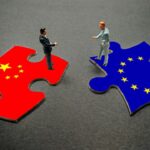China’s central government has convened three important meetings within two weeks to discuss and lay out major tasks related to economic and social development, at a time when the nation’s economy has rode on the fast track of recovery, experts said.
The meetings are follow-ups of the Central Economic Work Conference held in December last year, which offer “timely precautions” amid growing external volatilities such as the brewing US banking system crisis.
On April 28th, the Political Bureau of the CPC Central Committee convened a meeting to analyze and study the country’s current economic situation. On Friday, the 20th Central Commission for Financial and Economic Affairs held its first meeting to discuss accelerating the construction of a modern industrial system and high-quality population development.
Also on Friday, a State Council executive meeting adopted a guideline on accelerating the development of advanced manufacturing groups, calling for greater priority to be given to the development of advanced manufacturing clusters.
The Global Times observed that the terms such as real economy, modern industrial system and technology self-reliance were common focus of these meetings, which experts said reflect China’s latest gauge of international situation, and Beijing’s roadmap for local authorities to navigate as global headwinds are mounting.
“From the meetings, I would say high-quality development jumps out as a catch-phrase of China’s way of handling challenges at home and abroad,” Zhang Hong, an independent macroeconomic expert, told the Global Times on Sunday.
The current uptick in China’s economy is mainly led by post-pandemic recovery, with endogenous driving force remaining weak and demand insufficient. The country’s economic transformation and upgrade face new headwinds, and hardships and challenges are to be overcome to promote high-quality growth, the Political Bureau of the CPC Central Committee said.
Held in an important year – the first year for fully implementing the guiding principles of the 20th Communist Party of China (CPC) National Congress – and coming at a time when Chinese economy is recovering rapidly, these meetings stressed the importance of stabilizing and expanding domestic economy, Hu Qimu, deputy secretary general of the digital real economies integration Forum 50, told the Global Times on Sunday.
China’s consumption has been firing on all cylinders during the just-ended May Day holidays, ranging from tourism, box office, transportation, entertainment to catering sectors. A total of 274 million trips were made during the holidays, up 70.83 percent year-on-year, equivalent to 119.09 percent of 2019’s levels, according to data released by the Ministry of Culture and Tourism.
“To maintain the momentum, the economic recovery ought to be a high-quality rebound, and the industrial chain should also be modernized so that we can be more proactive in the next round of global competition,” Hu said.
State Council executive meeting on Friday laid out arrangements in pushing forward the high-quality development, as the meeting called for greater priority to be given to the development of advanced manufacturing clusters, as well as arrangements on speeding up the construction of re-charging infrastructure to promote new-energy vehicles in China.
The meetings placed a special focus on real economy, as officials believe that a modern industrial system backed by a strong real economy will determine whether China will be able to gain a strategic lead in global competition.
In Hu’s eyes, the emphasis on the real economy and better managing global geopolitical risks, reflect the policymakers’ “timely precautions” against uncertainties that may arise in the future.
The US economic situation seems unstable, said Hu, who said that an important reason behind a series of US economic woes is its industrial hollowing-out — relying heavily on monetary policy like interest rate hikes without sufficient support for the real economy, which leads to “asset bubbles, financial idling and systemic risks.”
Last week, US regulators have taken over First Republic Bank and struck a deal to sell the failed lender to JPMorgan. It’s the third mid-size bank in the US to capsize in two months, which will continue to cast a shadow on the country’s financial system.











